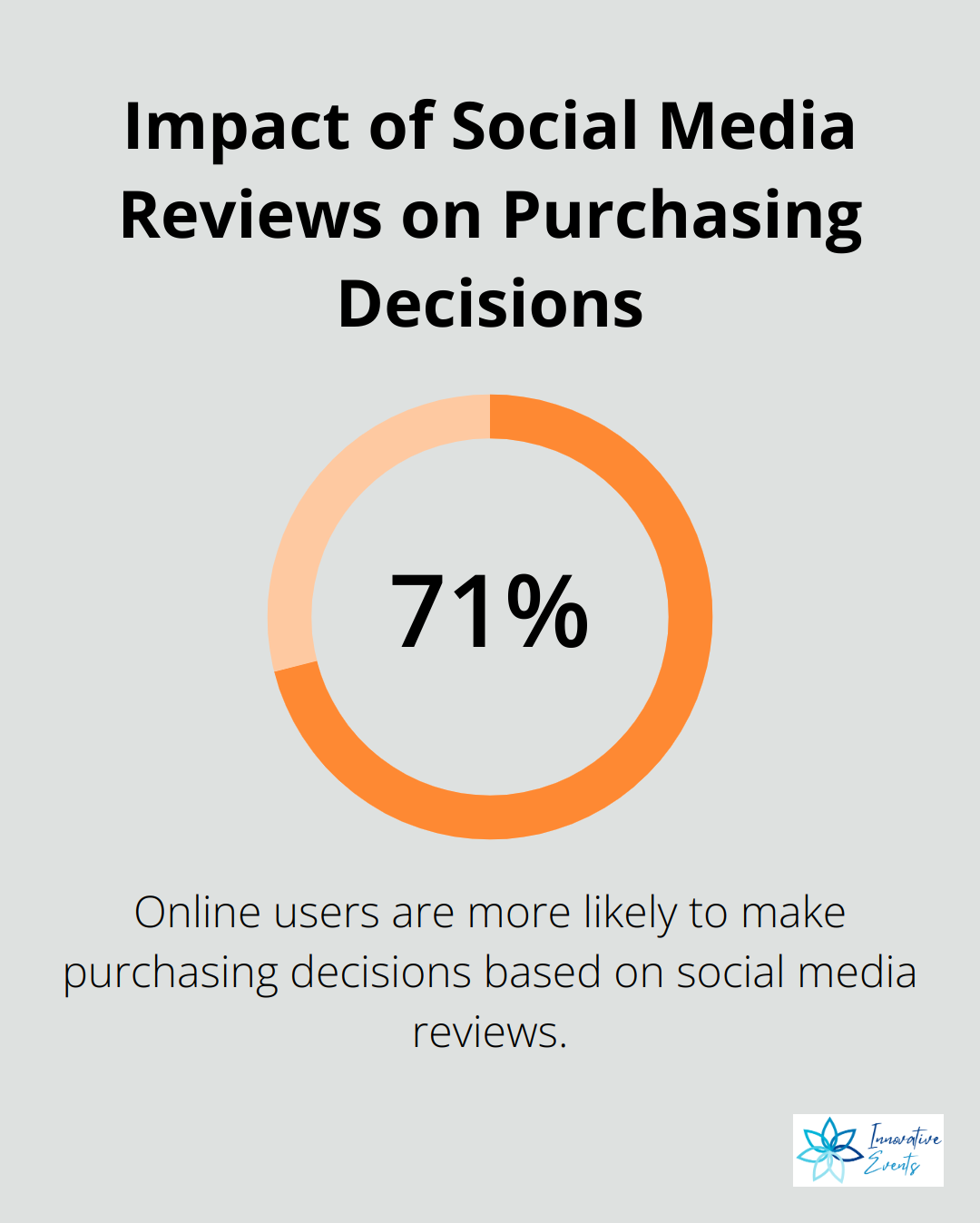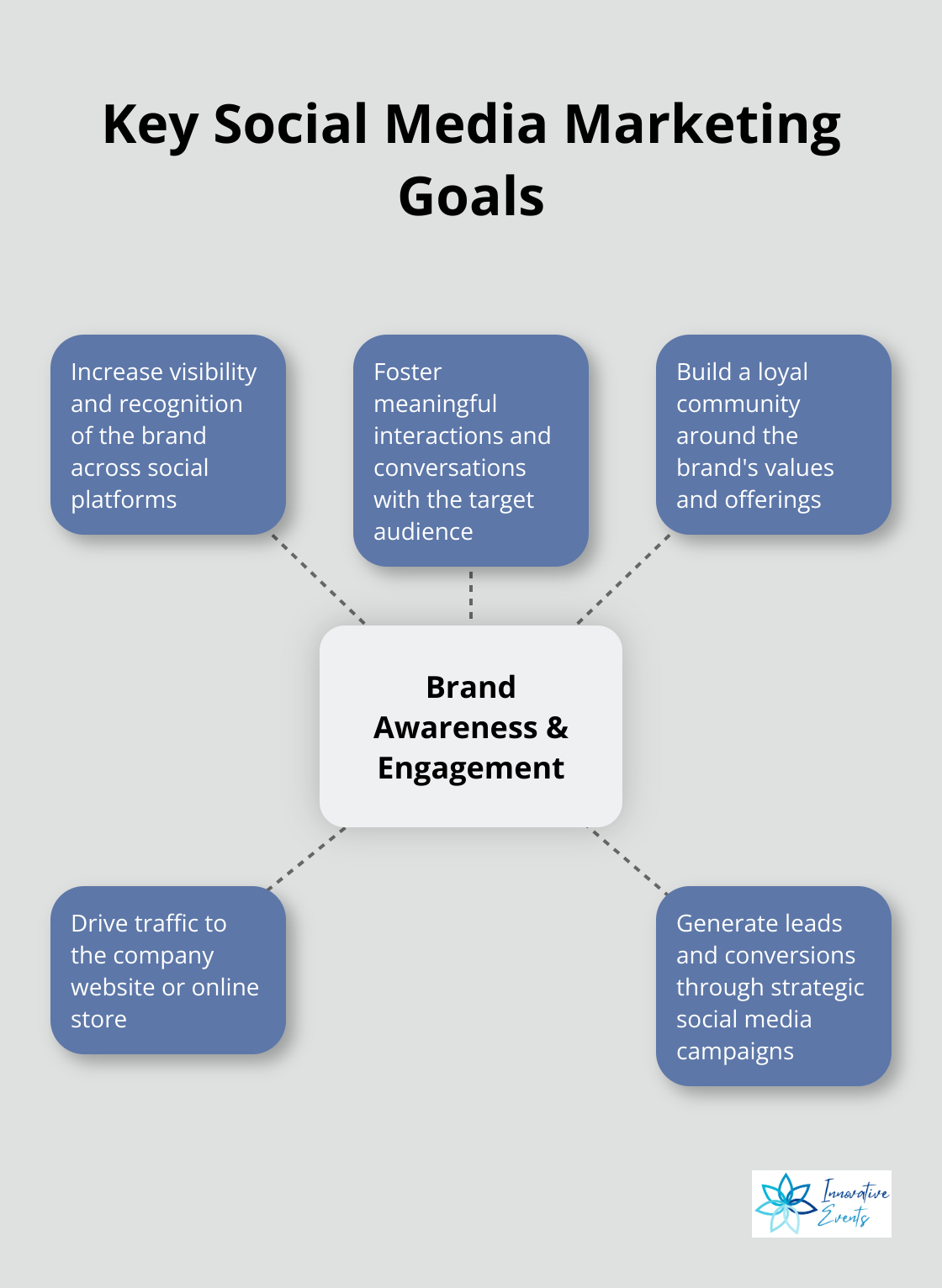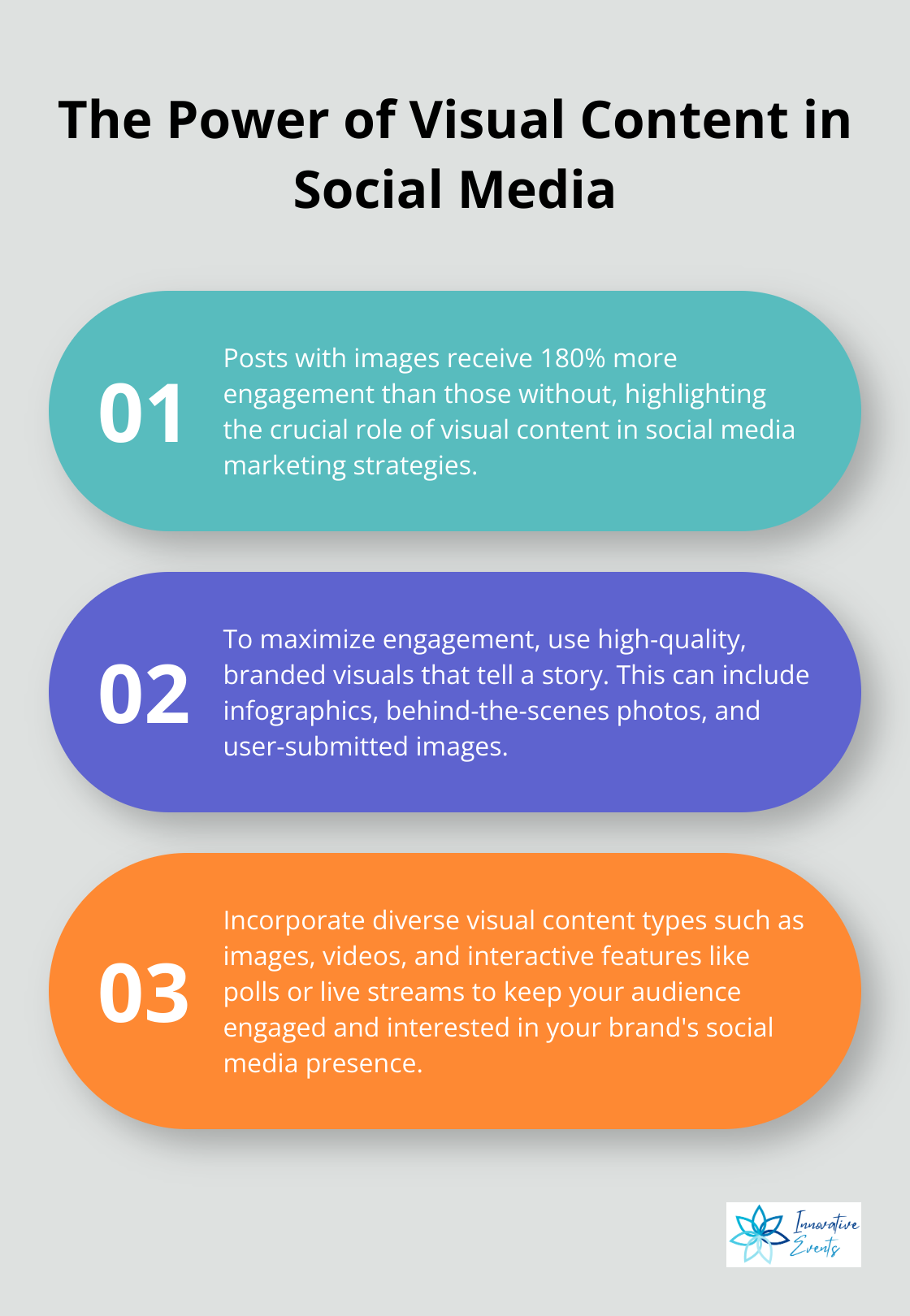Social media has revolutionized how businesses connect with their customers. At Innovative Events, we’ve seen firsthand the transformative power of social media marketing for customer engagement.
This blog post will explore effective strategies to boost your customer engagement through social media platforms. We’ll share practical tips, backed by data, to help you create a winning social media marketing approach.
Why Social Media Marketing Matters
The Revolution in Consumer Behavior
Social media has transformed how people discover, evaluate, and interact with brands. A recent study reveals that 71% of online users are more likely to make purchasing decisions based on reviews on social media. This statistic highlights social media’s pivotal role in shaping purchasing decisions.

Expanding Brand Reach and Engagement
Social media marketing’s power lies in its ability to amplify brand reach. With over 4.7 billion active social media users worldwide, these platforms offer unparalleled opportunities to connect with potential customers. However, it’s not just about reach – it’s about meaningful engagement.
These platforms enable brands to foster two-way conversations with their audience. This direct communication line builds trust and loyalty. Brands that respond to customer messages on social media see a 20% increase in customer satisfaction and a 15% boost in brand loyalty.
Platform-Specific Strengths
Different social media platforms offer unique strengths for customer engagement:
Facebook: The Versatile Giant
Facebook remains a powerhouse for customer engagement with its vast user base and diverse demographics. Its robust advertising tools and analytics make it ideal for targeted marketing campaigns. Facebook Groups have proven particularly effective for building community around brands.
Instagram: Visual Storytelling Powerhouse
Instagram’s visual-centric approach makes it perfect for brands with strong aesthetic appeal. The platform’s Stories and Reels features offer creative ways to showcase products and behind-the-scenes content. Instagram has an average engagement rate of 4.2%.
LinkedIn: B2B Engagement Hub
LinkedIn proves invaluable for B2B companies. It’s not just a platform for job seekers – it’s a hub for thought leadership and professional networking. LinkedIn has an average engagement rate of 2.8%.
TikTok: Viral Content Generator
TikTok’s rapid growth and highly engaged user base make it a goldmine for brands targeting younger demographics. Its algorithm favors content virality, offering even smaller brands the chance to reach millions of users.
Understanding these platform-specific strengths allows brands to tailor their content and engagement strategies effectively. The next chapter will explore how to craft an effective social media strategy that leverages these unique platform characteristics to boost customer engagement.
How to Create a Winning Social Media Strategy
At Innovative Events, we know that a successful social media strategy rests on four key pillars: goal-setting, audience understanding, content planning, and performance measurement. Let’s explore each of these elements in detail.
Set Clear, Measurable Goals
Start by defining what you want to achieve with your social media efforts. Your goals should be specific, measurable, achievable, relevant, and time-bound (SMART). For example, “Increase Instagram followers by 20% in the next quarter” is a SMART goal.
A study by Sprout Social found that 80% of marketers say their key social media goals are increasing brand awareness and community engagement. However, your goals should align with your overall business objectives. If you’re a B2B company, lead generation might be a more relevant goal than increasing followers.

Know Your Audience Inside Out
Understanding your target audience is essential for creating content that resonates. Use social media analytics tools to gather demographic data, interests, and online behaviors of your followers. Facebook Insights provides detailed information about your page followers, including age, gender, location, and when they’re most active online.
Don’t stop at demographics. Explore psychographics – your audience’s values, attitudes, and lifestyle choices. This information will help you create more targeted and engaging content. For instance, if you target environmentally conscious millennials, you might focus on showcasing your brand’s sustainability efforts.
Plan Your Content Strategically
A content calendar serves as your roadmap for consistent, high-quality posting. It helps you plan ahead, maintain a balanced mix of content types, and align your social media efforts with broader marketing initiatives.
When creating your content calendar, consider the 80-20 rule: 80% of your content should inform, educate, or entertain your audience, while only 20% should directly promote your brand. This approach helps build trust and keeps your audience engaged.
Also, pay attention to posting frequency and timing. According to Sprout Social, the best times to post on Facebook are Tuesday, Wednesday, and Friday from 9 a.m. to 1 p.m. However, these times can vary depending on your specific audience, so it’s important to test and adjust based on your own data.
Measure What Matters
Tracking the right metrics is vital for understanding the effectiveness of your social media efforts. While vanity metrics (like likes and followers) can be satisfying, they don’t always translate to business results.
Instead, focus on metrics that align with your goals. If your aim is to drive website traffic, track click-through rates and referral traffic from social media. For engagement, look at metrics like comments, shares, and saves. For lead generation, monitor conversion rates from social media campaigns.
Tools like Google Analytics can help you track how social media traffic converts on your website, while platform-specific analytics provide insights into post performance and audience engagement.
Social media marketing is an iterative process. Review your metrics regularly, learn from what works (and what doesn’t), and adjust your strategy accordingly. This data-driven approach will help you continually refine your social media efforts for maximum impact.
Now that we’ve covered the fundamentals of creating a winning social media strategy, let’s move on to explore specific tactics that will boost your customer engagement on these platforms.
Engagement Tactics That Drive Results
Spark Conversations with Compelling Content
Content that resonates with your audience forms the foundation of social media engagement. Posts that ask questions or solicit opinions generate twice as many comments as standard posts. A tech company might ask, “What feature would you add to our latest product?” This approach not only increases engagement but also provides valuable customer insights.
Visual content reigns supreme in the social media landscape. Posts with images receive 180% more engagement than those without (according to Sprout Social). Use high-quality, branded visuals that tell a story. Infographics, behind-the-scenes photos, and user-submitted images prove particularly effective in capturing audience attention.

Unleash the Power of User-Generated Content
User-generated content boosts trust, engagement, and conversions, turning customers into brand advocates and delivering cost-effective marketing results. Its authenticity and relatability build trust among your audience.
Encourage customers to share their experiences with your brand using a unique hashtag. Repost the best submissions and credit the creators. This strategy not only provides fresh content but also makes your customers feel valued and heard.
Maximize Interactive Features
Social media platforms offer a variety of interactive features that boost engagement. Instagram Stories polls, for instance, see an average completion rate of 90%. Use these to gather quick feedback or opinions from your audience.
Live videos generate six times more interactions than regular videos. Host Q&A sessions, product demos, or behind-the-scenes tours to give your audience a real-time connection with your brand.
Partner with Influencers
Influencer partnerships can significantly expand your reach and credibility. However, choose influencers whose values align with your brand.
Micro-influencers (those with 10,000 to 100,000 followers) often have higher engagement rates than macro-influencers. Their perceived authenticity and relatability can lead to better results for your brand.
Respond Promptly to Audience Interactions
Quick responses to comments and messages prove vital for maintaining engagement. 40% of consumers expect brands to respond within the first hour of reaching out on social media (as reported by Sprout Social).
Implement a system to monitor and respond to all interactions promptly. Use chatbots for immediate responses to common queries (while ensuring a human touch for more complex issues).
Final Thoughts
Social media marketing for customer engagement has become essential for businesses to connect with their audience meaningfully. We at Innovative Events understand the power of engagement in driving business success. Our personalized, integrative lifestyle program for busy executives demonstrates the importance of tailored approaches in achieving optimal results.
You should implement these strategies today to watch your customer engagement soar. Patience, persistence, and a data-driven approach will create a thriving social media presence that boosts engagement and drives real business results. Innovative Events can help you enhance your social media strategy, just as we help executives improve their health and performance through customized plans and cutting-edge methods.
Social media marketing requires authenticity, consistency, and adaptability. You must maintain a regular posting schedule and a cohesive brand voice across all platforms. This approach will establish your brand’s identity and keep your audience engaged over time.

